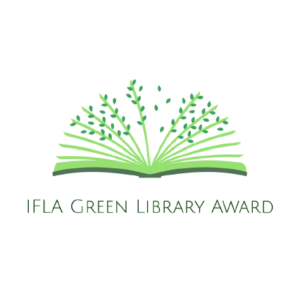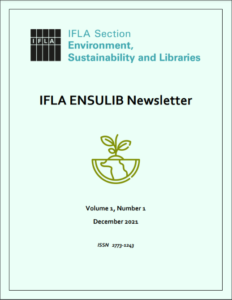To Plan and Develop a Green and Sustainable Library with the IFLA ENSULIB Section
04 April 2022

The IFLA Environment, Sustainability and Libraries Section (ENSULIB) has recently published an updated definition of a “green library”. The concept of “green library” has been discussed since the 1990s. Since then, libraries have been undertaking various activities in order to minimize the negative human impact on the natural environment, and a green library is associated with the concept of a sustainable library working toward this aim.
In this new definition from ENSULIB, a green library is a synonym for a green and sustainable library, which is a library taking into account environmental, economic and social sustainability. Green and sustainable libraries may be of any size, but they should have a clear sustainability agenda, which includes green buildings and equipment, green office principles, sustainable economy, sustainable library services, social sustainability, environmental management and commitment to general environmental goals and programmes – see our Green Library Definition webpage for details. This definition is translated into 10 languages at present, and more to come.
The United Nations 17 Sustainable Development Goals for the 2030 Agenda for Sustainable Development for human beings and the planet, and the Paris Agreement on global warming limit and climate change represent important global guidance and commitments.
 To increase awareness and encourage the activities of green libraries, ENSULIB initiated the IFLA Green Library Award in 2016. The prize is awarded in two categories: (a) Best Green Library: To be successful in this category, environmental and sustainable work should involve the whole library, (b) Best Green Library Project: To be successful in this category, the relevant project is limited in scope, time and budget. It should be significant in advancing environmental and sustainable goals.
To increase awareness and encourage the activities of green libraries, ENSULIB initiated the IFLA Green Library Award in 2016. The prize is awarded in two categories: (a) Best Green Library: To be successful in this category, environmental and sustainable work should involve the whole library, (b) Best Green Library Project: To be successful in this category, the relevant project is limited in scope, time and budget. It should be significant in advancing environmental and sustainable goals.
In addition, a Special Recognition goes to a project that was carried out with minimal resources but has a big impact. About 30 submissions for the Award 2022 have been submitted and are currently under review. We invite you to explore the selected global green libraries and green library projects from 2021. These examples serve as benchmarks for developing and enhancing green library initiatives locally, regionally and worldwide. The 2022 longlists and submissions will be released on the Award website in April . If you are ready to showcase your green library or library project, please consider entering for the IFLA Green Library Award in 2023.
Award evaluation criteria was published alongside translations in 8 languages, and can also be used as guidance. By following the criteria, libraries can understand more about the principles used to develop a green and sustainable library.
The Green Library Checklists are also available freely online in 27 languages to guide the green library planning, construction and library operations. LEED certification, a globally recognized symbol of sustainability achievement and leadership, provides a framework for healthy, efficient, carbon and cost-saving green buildings, including green library buildings. A calculator to provide insights into the topic to encourage librarians to think about actions and implement them in libraries (available in 8 languages) was developed by Nathalice Cardoso, a supporter of and advisor to the ENSULIB Standing Committee. Information about green libraries is continuously added to the IFLA ENSULIB Green Library Website.

The IFLA 2022 World Library and Information Congress (WLIC) is coming in July. ENSULIB is co-organising an Open Session with the Libraries for Children and Young Adults Section: Climate Action in Libraries: Creating a More Sustainable Future by Engaging and Inspiring Youth. A Satellite Meeting will also be held in Cork right before WLIC, with the theme Inspired and Engaged on Sustainability, co-hosted by ENSULIB, and the Management and Marketing and Preservation and Conversation Sections. We look forward to seeing you and interacting with you in person in Cork and Dublin this summer.
To follow the progress and activities of the ENSULIB Section, we invite you to subscribe to our newsletter. Previous editions and information about contributing can be found here: https://www.ifla.org/the-ifla-ensulib-newsletter-project/